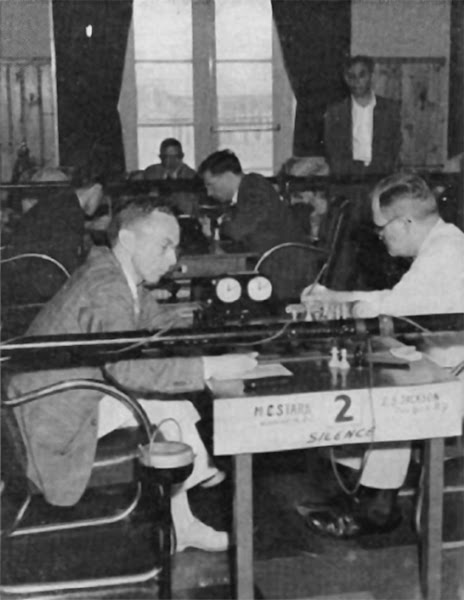Additional Games
- Chessgames
- Game, Edward Schuyler Jackson, Jr. vs. James Moore Hanham, Manhattan CC-Franklin CC, circa 1920
- Game, Edward Schuyler Jackson vs. Stasch Mlotkowski, Atlantic City Masters' Tournament, 1920.
 Chess Prizes Awarded 22 Jul 1920, Thu The New York Times (New York, New York) Newspapers.com
Chess Prizes Awarded 22 Jul 1920, Thu The New York Times (New York, New York) Newspapers.com
CHESS PRIZES AWARDED.
Special Honors Distributed Among Competitors In Masters' Tourney.
Special to The York Times.
ATLANTIC CITY. N. J., July 21.—In addition to the four regular prizes won by Marshall, Jaffe, Jackson and Mlotkowski, three special prizes were awarded today at a dinner tendered to the participants in the masters' tournament of the Atlantic City chess congress on the Million Dollar Pier, at which A. J. McClure of Lakewood, N. J., head of the congress, presided.
The first brilliancy prize was won by Edward S. Jackson of Philadelphia for his game against Mlotkowski of Los Angeles. The second brilliancy prize went to Charles Jaffe of New York for his game against Sharpe of Philadelphia, and the prize for the best-played game to Frank J. Marshall, New York, for his second game with Sharpe. The donors of these prizes were Sydney Rosensweig of the Manhattan Chess Club and William F. Drueke of Grand Rapids, Mich.
In his address at the dinner President McClure dwelt upon the universality of the game of chess, spoke of a game his father played with Paul Morphy and of his own meeting with the late Harry N. Pillsbury in whose honor he contributed the Pillsbury memorial prize which Marshall won.
The eighth American chess congress, for the purpose of arranging a national tournament a year hence, either in Atlantic City or elsewhere, according to circumstances, was organized with the following officers: Archibald J. McClure Lakewood. N. J., President; Matthew B. Markland, Atlantic City, and Herman Behr, New York. Vice Presidents: Edward S. Jackson, Philadelphia, Secretary; Walter Penn Shipley, Philadelphia, Treasurer.
 Jackson Retains U.S. Chess Lead 07 Nov 1944, Tue The Brooklyn Daily Eagle (Brooklyn, New York) Newspapers.com
Jackson Retains U.S. Chess Lead 07 Nov 1944, Tue The Brooklyn Daily Eagle (Brooklyn, New York) Newspapers.com
Jackson Retains U. 5. Chess Lead
Edward S. Jackson Jr. of Short Hills. N. J., national amateur chess in 1942, kept the lead in the tournament for the 1944 title at the Marshall Chess Club yesterday when he drew his tenth-round game with Louis Schneider of Manhattan, third in the race.
Irving Stein of the Bronx defeated Gustaf Gustafson of Brooklyn in game from the twelfth round and took second place. Gustafson dropped to fourth place.
 At 80, He's After The Championship 27 May 1977, Fri Newsday (Suffolk Edition) (Melville, New York) Newspapers.com
At 80, He's After The Championship 27 May 1977, Fri Newsday (Suffolk Edition) (Melville, New York) Newspapers.com
At 80, he's after the championship
On a March day in 1911, Edward S. Jackson, a student at the Chestnut Hill Academy in Philadelphia, saw several classmates about to board a train. They were headed for the scholastic chess championships, which would last all day and, more than likely, all week. Jackson made a mental note: “Here's where I get out of going to classes next year.”
Jackson, now 80, is a two-time U.S. amateur chess champion. The Flushing resident, who has been legally blind since 1972 as the result an eye ailment, said he is “getting [his] mind in shape” for the U.S. Blind Chess Championship, which begins tomorrow in Westfield, N. J. Among the champions Jackson encountered across the board over the years was the late world champion Jose R. Capablanca. Jackson recalled that Capablanca “at one point could calculate 750 moves” ahead. Jackson's calculations can be observed regularly at the Manhattan Chess Club, where he plays eight-minute games—“lightning chess”—four days a week.
“We're a breed apart,” he says. “Most of the rest of the world thinks we're crazy. I wouldn't be surprised if they were right. But those fellows banging away on the piano, I think they're nuts.” Jackson termed chess a “Godsend,” particularly because of the afflictions of age and near-sightedness. “If I didn't have chess,” he said, “I'd be in hell's half acre.” Instead, Edward S. Jackson is readying his moves for the championship.
—Peter M. Gianotti
























